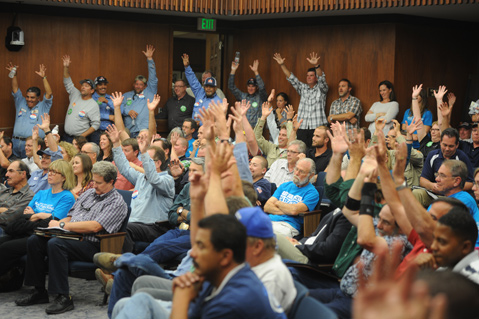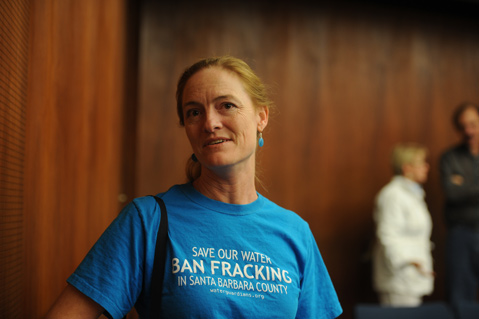Energy Workers and Reps Blast Anti-Fracking Effort
Enviro Leaders and Organizations Conspicuously Silent on Issue

With climate change, earthquakes, and drought fears occupying the collective consciousness, one group’s efforts to ban fracking and other controversial enhanced oil-drilling techniques could not have come at a better time. Carrying the torch is a new grass-roots organization dubbed Water Guardians, which mushroomed from a small group into hundreds of volunteers in a matter of weeks. At Tuesday’s Board of Supervisors meeting, the county registrar announced that the group had gathered enough valid signatures to potentially ban “high intensity” operations on unincorporated land in Santa Barbara County. Undoubtedly caught off guard by the “spontaneous” effort, dozens of opponents of the initiative posed unanswered questions on Tuesday. But one point was clear: The ban is heading to the November ballot, barring the slim chance that the supes adopt it without alteration at a special meeting on June 13.
Noticeably absent from the handful of supporters who commented on Tuesday were prominent Santa Barbara environmentalists. Representatives from Surfrider, the Environmental Defense Center (EDC), the Community Environmental Council (CEC), Channelkeeper, and other organizations did not speak in an official capacity. Katie Davis, who helped spearhead Water Guardians and has been involved with Santa Barbara chapters of 350.org and the Sierra Club, said many key enviros have been working behind the scenes. Some were among the hundreds who wore bright blue T-shirts and flocked to grocery stores and farmers markets in both southern and northern parts of the county to gather 16,000 valid signatures in just under a month — 3,000 more than required. All gatherers were volunteers, Davis said, and the group has stayed afloat from one $3,000 grant from the Fund for Santa Barbara and other small donations.

Many people had doubts the organization would be able to gather enough signatures in such a short period of time, which, according to Davis, is another reason some of the bigger names have yet to officially come forward. A native of Summerland, Davis said she had never considered herself an “activist” but rather a concerned citizen who slapped solar panels on her roof years ago and has long driven a white Nissan LEAF. Legally representing the Water Guardians is San Francisco–based attorney Rachel Hooper, who drafted the initiative. Hooper is with a firm that specializes in environmental law — Shute, Mihaly, and Weinberger LLP — and has decades of experience working on land-use permits.
On Tuesday, several dozen opponents took to the podium. Many said they represented modest oil-industry employees; several claimed the ban would destroy jobs in a robust industry; a number said it could be legally problematic. “Believe me, this is a wolf in sheep’s clothing,” asserted one opponent. Several others contended that “high intensity” is actually “high efficiency,” which decreases the cost of energy. “[I]t’s so misguided; I can’t stress it enough,” said former Carpinteria city councilmember Joe Armendariz.
Though it’s become the buzzword, fracking isn’t currently occurring in the county. But another enhanced oil-extraction technique known as cyclic steam injection is happening, and it appears to be on the upswing. In the past 12 months, the county approved 239 new wells, and 166 of them will use cyclic steaming. Currently, hundreds of cyclic-steam wells are operating in the county, and according to the county’s Energy Division director, Kevin Drude, oil companies Aera Energy and ERG Resources are in the process of submitting formal applications for what will likely be hundreds of cyclic-steam wells.
Claiming to represent the taxpayers, other opponents predicted the county will experience a legal nightmare if this ban passes. They contended landowners — individuals as well as oil companies — who own the mineral rights could sue the county because their property value diminished because of the ban. But Water Guardians attorney Hooper claimed constitutional takings cases are rare and very difficult to prove. Also, the initiative includes an exception: Property owners who demonstrate that the measure would constitute a taking could receive an exception from the supervisors.
Exactly how this ordinance would be interpreted legally remains to be seen. Supporters have maintained that the ban would not impact current projects that have been approved and made “substantial progress.” Currently, at any given time, 2,600 oil wells are operating in the county, and a fraction of those use unconventional methods. But according to one interpretation of the initiative, most if not all wells at some time could be considered a “high intensity” operation because chemicals are used to maintain the wells. In response, Davis contended this ban merely focuses on well stimulation and does not prohibit well maintenance.
Other opponents have contended that Senate Bill 4 — which passed last year and is currently studying the effects of fracking — will implement sufficient regulation by 2015, and Santa Barbara County is one of the only counties in the state to have an energy division to monitor oil operations.
A handful of other counties and cities have issued moratoriums on fracking in recent months, and on Tuesday, Santa Cruz County Board of Supervisors voted to prohibit fracking and all oil and gas development — largely as a preventative measure. (Just last week, the environmental watchdog group Los Padres ForestWatch stopped three fracking operations in the Sespe oil field located in the national forest in Ventura based on errors in the permit process.)
The supervisors voted for staff from the energy division to draft a report of the economic impact of the initiative. County Counsel will dissect the legal language. The supes’ 3-2 vote included the option to adopt the ordinance at the special meeting in June.



